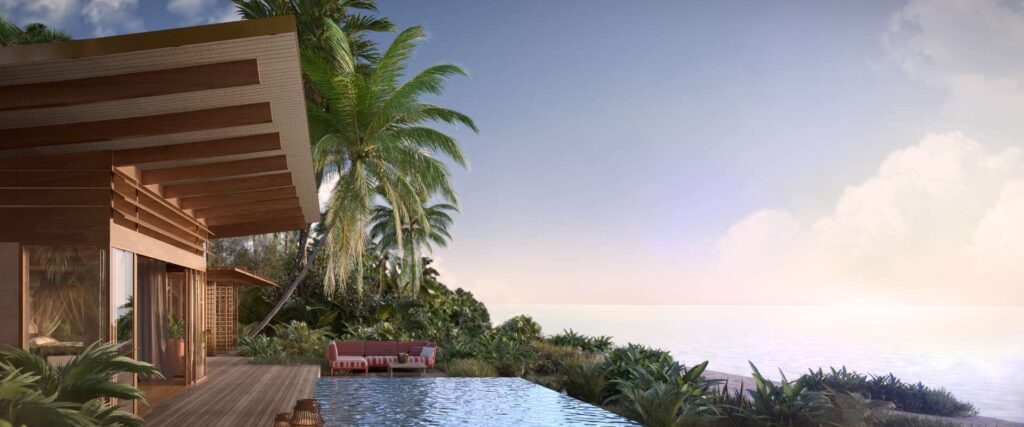
By 2026, the landscape of global travel will undergo a dramatic transformation. The most anticipated hotel openings are not confined to traditional tourist hotspots or dominated by well-known global brands. Instead, they are emerging across untamed East African escarpments, etched into the granite valleys above the Red Sea, nestled on Baltic islands with pristine dark skies, and perched on Patagonian estancias overlooking live ice fields.
In this new era, luxury is redefined. It is not about opulence but about tranquility—silence so profound that the whisper of the wind through native grasses becomes audible. It is about architecture that harmonizes with the land rather than altering it. Imagine a converted Florentine chapel resonating more deeply than any modern palace or a secluded Estonian island retreat offering the luxury of time that flows with the seasons rather than digital notifications.
Here is a closer look at these groundbreaking destinations that should be on every traveler’s radar for 2026.
Airelles Venezia: A Venetian Escape
Venice, Italy, a city known for its noble addresses, will welcome Airelles Venezia, a sanctuary that promises a unique sense of peace. Located on Giudecca Island, this hotel transforms the former Bauer Palladio complex into a verdant retreat, more akin to a walled villa than a typical palazzo. The property features expansive gardens, a rarity in Venice, with gravel paths meandering under citrus trees and shaded loggias. Visitors can enjoy the brand’s signature elegance amidst the textures of the lagoon, while boats whisk them to St. Mark’s Square in just five minutes for exclusive after-hours experiences.
Maison Dada: A Beirut Gem
In Beirut, Lebanon, Maison Dada stands as a testament to resilience and creativity. Overlooking Martyrs’ Square in Saifi, this “micro-hotel” occupies a 1935 French Mandate house, lovingly restored by brothers Marc and Mario El Dada. The hotel features three multi-room apartments, each celebrating its original geometric tiles with vibrant color palettes. Local artisans crafted the furnishings, blending mid-century influences with natural materials. The hotel also boasts a significant art collection, transforming the space into a living gallery.
Eha: A Baltic Retreat
On Estonia’s Hiiumaa Island, a UNESCO Biosphere Reserve, Eha offers a serene escape with just 22 guests. Architect Tiit Trummal has designed eight suites and three forest cabins that blend seamlessly with the natural surroundings. The interiors, crafted by Studio Argus, UNT+CO, and Vaikla Studio, emphasize pale wood, stone, and wool, framing breathtaking views of the sea and sky. The wellness program, led by Kai Laus, aligns with the region’s five-season cycle, offering activities like birch-branch sauna rituals and foraging walks. The dining experience, led by Green Michelin Star chef Peeter Pihel, focuses on local, sustainable ingredients.
Vestige Collection Namibia: A Journey Through Time
Vestige Collection’s latest venture in northern Namibia offers a circuit of four lodges that celebrate the stark beauty of the African landscape. Known for reviving historic estates in Spain, Vestige’s understated architecture allows the natural topography to shine. Each lodge, from Omantedeka near the Grootberg range to Xaudum in Khaudum National Park, offers unique vistas and wildlife encounters, including sightings of the black rhino.
Casa Laveni: Milan’s Architectural Revival
In Milan, Italy, Casa Laveni is set to become a focal point of architectural and cultural interest. Situated in Brera, this 19th-century palazzo is being transformed into a 30-room hotel by Bohopo, with Delogu Architects and Studio Sacchi Architetti at the helm. The design blends Belle Époque elegance with contemporary Milanese craftsmanship, creating a space that feels both historic and modern. Its location offers easy access to iconic sites like La Scala and the Duomo.
Erebero Hills: Redefining Uganda’s Gorilla Circuit
Asilia Africa’s Erebero Hills in Uganda offers a new perspective on the gorilla trekking experience. Located on the northern rim of Bwindi Impenetrable Forest, the lodge features eight bamboo-built suites designed by Pablo Luna Studio. The architecture integrates with the landscape, providing stunning views and a deep connection to nature. The lodge’s conservation efforts include reforestation and community engagement with the Batwa people.
Nobu Hotel Elbtower Hamburg: A Skyline Icon
Hamburg, Germany, will see the addition of the Nobu Hotel Elbtower, a striking new landmark designed by David Chipperfield Architects. Rising 800 feet over HafenCity, the hotel offers a sophisticated blend of modern luxury and local influences. The interior design by Ester Bruzkus Architekten incorporates elements of the North German coast, creating a unique sense of place. The hotel features a spa, gym, and a 56th-floor Nobu Members Club, establishing it as a premier destination for discerning travelers.
Looking Forward: The Future of Travel
The opening of these hotels in 2026 signals a shift in the travel industry towards more sustainable, culturally immersive, and architecturally sensitive experiences. As travelers seek deeper connections with their destinations, these properties offer a glimpse into the future of luxury travel. By prioritizing harmony with the environment and local communities, these hotels set a new standard for hospitality, promising unforgettable experiences that go beyond traditional luxury.
As the travel industry continues to evolve, these destinations represent a significant step forward, offering travelers a chance to explore the world in new and meaningful ways. Whether it’s the tranquility of a Baltic island or the vibrant culture of Beirut, these hotels promise to redefine what it means to travel in the 21st century.





